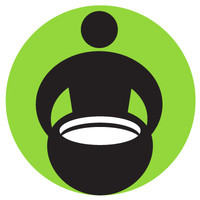
This is part of a series on "The Future of Fair Trade," written with the support of Fair Trade USA. A 501 (c) (3) nonprofit organization, Fair Trade USA is the leading third-party certifier of Fair Trade products in the United States. To follow along with the rest of the series, click here.
By Jenna Larson
It’s National Farmworker Awareness Week, a time to remember that 85 percent of the fruits and vegetables we eat here in the U.S. are hand-picked. That’s right -- the healthy veggies for our healthy lifestyles, sweet fruits for snack-time and even the flowers that brighten our tables. Farmworkers across the globe are out in the fields from dawn to dusk, working hard to feed the world. But at what cost?
A new report from the Los Angeles Times paints a rather disturbing picture of what some laborers face — unsanitary and unsafe conditions, poor housing, exposure to harmful chemicals, debt bondage, and in some cases child labor.
These realities exist, and we must both acknowledge and work to change them. At the same time, we also have to remember that there are many farms out there doing good. For every disheartening reality we see or read about, there are farms working hard to support their workers and directly combat the conditions outlined by the LA Times. Thanks to certification programs like Fair Trade, these farms and farmworkers are empowered to create safe, sustainable, vibrant farming communities.
How is this possible? Let’s examine how the Fair Trade model honors farmworkers, not just during a single week, but all year long.
1. Fair Trade creates fair labor conditions
Fair Trade farmworkers have access to healthcare, regulated working hours, rest and sick days, transparent contracts, freedom of association, and many other benefits — a collection of strict standards that create a more equitable labor model while safeguarding the workers’ welfare and dignity.
2. Fair Trade is committed to worker health and safety
Fair Trade standards cover over 200 criteria protecting worker's rights, in particular their well-being. Farms, packing plants and housing are all audited for health and safety risks — from fire safety and sanitary conditions to the appropriate use of protective equipment to prevent injuries and pesticide exposure. (The National Cancer Institute reports that the rates for certain cancers like Leukemia appear to be higher among agricultural workers, which may be related to pesticide, solvent and dust exposures commonly found on farms. This makes training, protective equipment and elimination of the worst chemicals so important.)
Quality and food safety is another crucial area that's directly affected by worker health and happiness. A farm may have exquisite greenhouses and sanitation practices, but this system can be easily compromised if workers come and go after using dirty bathrooms, if they don't have time or clean facilities to wash their clothes and shower between shifts, or if they must work while sick in order to feed their families.
3. Fair Trade gives workers a voice
Every time a box of Fair Trade produce or bushel of flowers is sold, workers earn a Community Development Premium — money that they earmark, and vote on democratically, to address their most pressing needs. For example, the workers of Bananeras de Urabá SA, a Fair Trade banana producer in Colombia, voted to use their premiums to build an apartment complex. Access to safe, clean housing was one of their greatest needs, and they addressed it together through Fair Trade. They also constructed a bridge to provide a much shorter walk between home and work.
At Wholesum Harvest, a Fair Trade produce farm in Mexico, workers voted to purchase a bus to take them to and from work, and their children to and from school. Previously they would have to travel long distances, and pay expensive bus fares — costing up to a third of a worker’s daily salary. The purchase of the bus saves a tremendous amount of precious time and money.
4. Fair Trade creates direct ties between producers and shoppers
Every fruit, vegetable or flower bearing the Fair Trade label — found at retailers like Whole Foods Market (which purchases over 75 percent of all Fair Trade produce), Costco, Safeway and Earth Fare among others —doesn’t just tell you that you’re buying an ethically-sourced product that supports worker livelihoods. It also helps you create a powerful and more intimate connection with the producers themselves.
Just ask Elvia Almachi, a mother, student and flower farmworker at the Agrogana flower farm in Ecuador. By day she packs roses — most of which go to Whole Foods Market — and by night she attends the adult school program funded by the Fair Trade Premium.
“Please continue to believe in us. It’s through these Fair Trade flowers that hundreds of families like mine continually improve our lives.”-- Elvia Almachi
Take action
If you’re looking to support farmworkers like Elvia, it’s important to use your voice and show your support for Fair Trade:
- Ask your retailer, café, restaurant, school or office to carry Fair Trade products.
- Join or start a Fair Trade Campaign in your community to help get more Fair Trade products in local establishments — you can even help your city government pass a procurement policy or resolution!
- Spread the word about Farmworker Awareness Week on social media, and tell your friends about Fair Trade.
“The fight is never about grapes or lettuce. It is always about people.”--Cesar Chavez

Fair Trade USA is a nonprofit organization that is the leading third-party certifier of Fair Trade products in the United States. Fair Trade USA audits and certifies transactions between U.S. companies and their international suppliers to guarantee that the farmers and workers producing Fair Trade Certified goods were paid fair prices and wages, work in safe conditions, protect the environment, and receive community development funds to empower and uplift their communities.














